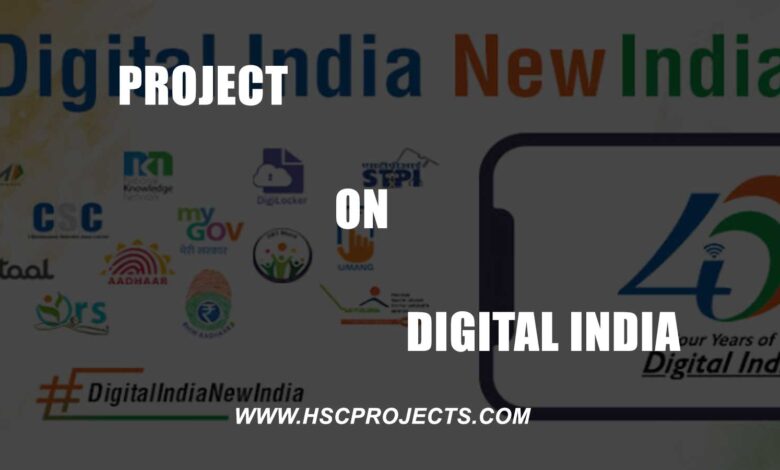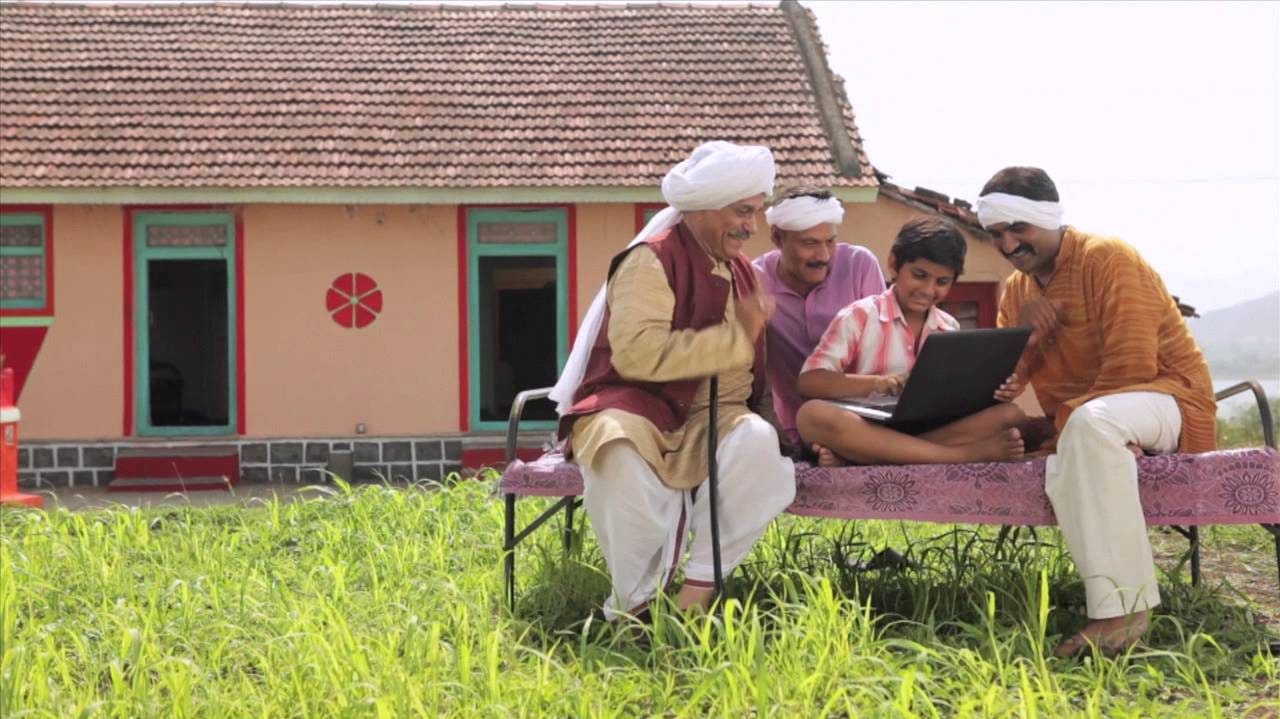
Digital India Project Class 12 and 11 – Economics
INTRODUCTION

Digital India is an initiative of the government of India to integrate the government departments and the people of India. It aims at ensuring that government services are made available to citizens economically by reducing paperwork. The initiative also includes a plan to connect rural areas with high-speed internet works. Digital India has three core components.
These Include
- The creation of digital infrastructure
- Delivering services digitally
- Digital Literacy
WHAT IS DIGITAL INDIA?
- Digital India is a program to prepare India for a knowledgeable future.
- The focus is on being transformative-to realize IT+IT=IT
DIGITAL INDIA: A PLETHORA OF OPPORTUNITY FOR IT
- Today we are in the midst of a third industrial revolution powered by digitalisation, the first one being driven by steam engines & electricity.
- Digital transformation is causing a massive upheaval in cross-industries & socities. When it comes to the pace of technology advancement we are firmly in the second half of the Chen board where each subsequent advancement is massively more impactful than all previous advancements.
- A key area of investment under this initiative is to improve the government to citizen interface of various service deliveries. The government is serious about automated delivery of services & we can see it in the JAM paradigm -JOM Dhan Yojana for direct benefit transfer based on Aadhar infrastructure & mobile interface for banking.
- The government has saved Rs13,000 crore in booking gas subsidiaries. past fiscal setting technology to use and now proposes to extend the technology to deliver MNREGS subsidies.
- For technology companies. Digital India opens up a plethora of opportunities such as building the broadband infrastructure, creating identity solutions payment systems, web or mobile-based delivery structures and so on.
- Cybersecurity is another key area of focus
- Smart cities are another big area of opportunity for technology companies as part of digital India.
- Closely tied to the digital program is the ‘Make in Inda’ initiative. For India to transition to a digital future a greater proportion of its consumption must be serviced locally.
ACHIEVING DIGITAL INDIA

- The obvious function of Digital India’s is the repetitive infrastructure, but the government’s conception of infrastructure is somewhat lopsided and too broad in some aspects. while not emphasizing others enough.
- The first step has to be to create a robust extensive fibre optic network and to make more specimens available for wireless connectivity. The latter in particular with the use of smart homes and smaller tablets will make expensive projects such as common service centres almost unnecessary.
- A nationwide digital network will require robust software, especially for security. the continental instances of security breaches in developed countries with supposedly advanced digital infrastructure reinforce the view that security is a paramount concern for new digital infrastructure.
ACHIEVING DIGITAL INDIA
- The government of India has initiated a giant loop forward to transform the country into a digital knowledge economy.
- Digital Inda will help in leveraging India’s globally acclaimed IT competence for the benefit of 120 crore Indians.
- It will help in reducing corruption, getting things done quickly & will help in reducing paperwork.
- Some of the facilities which would be available through this initiative are a Digital locker, Education, e-health, Digital signature and national scholarships portal.
DIGITAL INCLUSION INTEGRATED INTO SOCIAL SERVICE
The imperative comprehensive digital inclusion strategies are not solely tried to economic issues but also government agencies their sum e-govt initiative to improve citizen services & optimized operational efficiency.
- Educational content also needs to be available in major Indian languages
- The final aspect of implementing a vision of Digital India should be digitizing the internal working of government not just at the national and state levels, not just at the national & state levels but down to local governments. This is a huge undertaking. Even basic aspects of operations such as accrual accounting are absent- from sub-national tiers of government.
- The second priority is to make sure that there is enough expertise to maintain this infrastructure.
- Third, basic software implementation & educational content should be made available in multiple Indian languages.
As a result, a growing number of services are being offered to the public online these include
- Food assistance
- Training opportunities
- Recreational facilities and programme
- Financial assistance
VISION OF DIGITAL INDIA

Shri Narendra Modi’s vision of digital India
I dream of an India where
- High-speed digital highways unite the nation.
- 12 connected Indian drive innovation
- Access to information no barriers
- The technology ensures the citizen-government interface is incorruptible
- Government proactively engages with the people through social media.
- Quality education reaches the most inaccessible connections driven by digital earings.
- Quality healthcare percolates light up to the remotest regions powered by e-healthcare.
- Farmers are empowered by real-time information to be connected to the global markets.
- Mobile enable emergency services to ensure personal security.
- Mobile& E-banking ensure financial inclusion.
3 KEY AREAS
INFRASTRUCTURE AS UTILITY TO EVERY CITIZEN
- High-speed internet as well as core utility.
- Grade to grave digital identity-unique, lifelong, online and authenticable.
- Mobile phone & Bank Account-enabling participation in digital & financial space.
- Easy access to a common service centre.
- Shareable private space on a public cloud.
- Safe and secure cyber-space.
Original India provides the intensified impetus for further momentum and progress for e-Governance and would promote inclusive growth that covers electronic services, products, devices, manufacturing and job opportunities.
GOVERNANCE AND SERVICES ON DEMAND
- Seamlessly integrated across departments or jurisdictions.
- Services are available in real-time from online & mobile platforms.
- All citizen entitlements are to be available on the cloud.
- Services digitally transformed for improving the ease of doing business
- making financial transactions Electronic & cashless.
- Leveraging G’s for decision support systems & developments.
DIGITAL EMPOWERMENT OF CITIZEN

- Universal Digital literacy
- Universally accessible digital resources.
- All documents/certifications are to be available on the cloud.
- Availability of digital resources/services in Indian languages.
- Collaborative digital platform for participative governance.
- Portability of all entitlements through the cloud.
- Universal digital literacy.
- Universally accessible digital resources.
- Availability of digital resources/services in Indian languages.
PROGRAMME MANAGEMENT STRUCTURE

The programme management structure for the Digital India programme as endorsed by the Union cabinet is as follows.
For effective management of the Digital India programme the programme management structure would consist of a monitoring committee on digital India needed by the Prime Minister, a digital India Advisory group cheered by the minister of communications & IT and an apex committee chaired by the cabinet secretary.
The structure has the needed secretarial monitoring/technical support & appropriate decentralization of power & responsibility to ensure the effective execution of the various projects/components by the implementing departments/teams.
Key components of the programme management structure would be as follows
- CABINET COMMITTEE ON ECONOMIC AFFAIRS(CCEA) for programme level policy decisions.
- Monitoring committee on digital India under the chairpersonship of the prime minister which will be constituted with representation drawn from relevant ministries/departments
- A digital India advisory group headed by the minister of communications and IT
- Apex Committee.
- Expenditure finance committee 9EFO)/ committee on nonplan expenditure
- A council of mission leaders on digital India
- State committee on Digital India
FOr effective monitoring of Digital India’s usage of the project management information system would be mandatory in each new & existing mission mode project to capture the real or near-real crime details about the progress of the project. This cool should be proficient enough to capture the parameters for each stage of the project namely conceptualisation & development.
Since “e-Kranti”.natioanl e-governance plan 2.0 is already integrated with the Digital India programme, the existing programme management structure established for the national e-governance plan at both national& state levels.
IMPACT
the estimated impact of Digital India by 2019 would be cross-cutting ranging from broadband connecting in all panchayats.
EFFECTS OF DIGITAL INDIA PROJECT BY 2019
- Wifi in 2.5 lakh educational institution,all universities,community,wi-fi location for people.
- Job creation: immediate 1.7 cr and oblique at least 8.5cr
- India to be innovative in 17 us in solutions health, knowledge, financial.
- High spend investment in 2.5 lakh villages universal phone connection
- 400,000 community internet access point
- Digitalisation by 2020.
- e-governance & e-service across government.
- Originally motivational people public reasoning internet access.
- The programme will generate a huge no of IT.welcome & electronics jobs, both directly & indirectly
The success of this programme will make India originally empowered & the leader in its usage of It in the delivery of services related to carrier domains.
NINE PILLARS OF DIGITAL INDIA
- BROADBAND HIGHWAYS
This covers three sub-components, namely broadband for all rural. Broadband for all urban & natural information infrastructure under Broadland for all rural,250 thousand village panchayats would be covered by December 2016.DOT will be the nodal department & the project cost is estimated to be approximately Rs 32,000 crores. under broadband for all urban, virtual network operators would be leveraged for device delivery & communication infrastructure. - UNIVERSAL ACCESS TO MOBILE CONNECTIVITY
The initiative is to focus on network penetration & fill the gaps in connectivity in the country. Al together 42,300uncovered villages in India will be covered for providing universal mobile connectivity in the country.DOT will be the model department & project cost will be around Rs16,000 or driving EY 201-2018. - PUBLIC INTERNET ACCESS PROGRAMME
The euro sub-components of the public internet-access programme are common service centres & post offices as multi-service centres common services centres would be when themed e its number would be increased from approximately 135,000 operation ar present to 250,000 i.e one 9SC in each gram panchayat. ( SC would be made viable multi-functional and points for delivery of government and business services. - E-GOVERNANCE REFORMING GOVERNMENT THROUGH TECHNOLOGY
Government Business process re-engineering using It to improve transaction is the most critical for transformation is the most critical for transportation across government & therefore needs to be implemented by all ministries/ department. The guiding principles for reforming government–through technology from simplification & field reduction forms should be made simple & user frequency 7 only minimum. - E-KRANTI-ELECTRONIC DELIVERY OF SERVICE
There are 31 mission mode projects under different stages of the governance project lifecycle, further 10 new MMPs have neem added to thee-Kranti by the Apex Committee on the National e-governance plan (NCGP) headed by the cabinet-secretary units meeting held on 18th March 2014. - INFORMATION FOR ALL
Often Data platforms & online hosting of information & documents would facilitate & easy access to information for citizens. Government shall pro-actively engage through social media and web-based platforms to inform citizens My Gov. has already been launched as a medium to exchange ideas/suggestions for the government. - ELECTRONIC MANUFACTURING
Target NET zero imports is a striking demonstration of intent. This ambitious goal requires coordinated action on many fronts. Taxation incentives. Economics of scale, eliminate cots disadvantages. Incubators, clusters. - IT FOR JOBS
1 Cr students from smaller towns & villages will be trained for IT sector jobs over 5 years. Delete would be the nodes department for this scheme.BPOs would be set up in every month eastern state to facilitate ICT enabled growth in these states.5 lakh rural workforce would be trained by the telecom service provider.
DIGITAL SERVICES IN RURAL AREAS

On its initiative, DEF is convincing and helping gram panchayats 24 village councils to take the digital route for better governance, set up their websites and facilitate elected panchayat representation to become digitally literate.
On its initiative, DEF is convincing and helping gram panchayats or village councils to take the digital rule for better governance, to set up their websites. In 2010, DEF in Partnership with the national information exchange of India, an autonomous body of the ministry of communication 7 IT, started convincing gram panchayats to set up their websites to go online.DEF initiated and rolled out the original panchayat programme in collaboration with the National Internet Exchange of India in 2010.
OBJECTIVES
- To empower citizens of every panchayat with bottom-up and lop down information & content.
- TO improve the development, governance & public service delivery at the panchayat level through the information on policy programmes and implementation.
- Co-create a digital data hosue at every panchayat level.
- To give a flip to the right to information campaign.
- More than 500 panchayats have been digitally enabled and they now have an online presence.
- Over 50 CIRCs in 10 states have digital panchayat centres which help panchayats to go online.
- Over5,000 gram panchayat members have been made digitally literate
- All digital panchayat centres have NELY affliction for providing training panchayat members.
SCOPE OF STUDY

- The overall scope of the study is to preface & make Indians aware of a knowledge future.
- On being transformative that is to realize IT (Indian Talent) + IT ( Information Technology) =IT (India Tomorrow)
- TO know about making technology central to enabling change. we can see the changes & development. The technology of India in a digital way.
- As digital India is being an umbrella programme, that is covering many departments.
- The programme weaves together a large number of ideas & thoughts into a single, comprehensive vision so that each of them is seen as part of a larger goal.
- Each element stands on its own but is also part of the larger picture.
RESEARCH OBJECTIVES
- The most important objective to study digital projects is to know about the digital services which India will go to adopt soon.
- To create awareness about the digital services among the young generation.
- To make students aware of how they can maintain digital wellness by taking informed decisions c becoming safe, respectful & responsible users of digital technology.
- To empower every citizen with accessible digital services knowledge & information.
- Imparting digital services to a rural area. The digital India campaign primarily aims to impact small towns & rural areas where a big chunk of the population is untouched by digital.
NEED OF STUDY
- To make people aware of the digital India project by the government of India.
- To effectively deliver the management of Digital India.
- The core philosophy of the digital India project is to give all citizens of the country access to the internet as a way to interact with their government’s avail of public services.
- To analyse the growth in areas of electronic services products, manufacturing & job opportunities etc after digitalization.
- To analyse the digital effects in the country after completion of the project by 2020.
- To increase the demand for e-services economy India.
RESEARCH METHODOLOGY
My research methodology requires gathering relevant data from the specified documents and compiling databases for a more complete understanding. I hope to shed light on the questions through my research.
- DATA COLLECTION
Primary data
A consumer survey in digital India - SECONDARY DATA
Study reports from the internet
Articles in newspapers & the internet - DATA COLLECTION TOOLS
Questionnaire survey
Internet
Newspaper - TYPES OF RESEARCH
Explanatory research
Description research - SAMPLING
Target population-Mumbai City
Sampling unit-Individual respondent
Sample size-100 respondents only
PRIME MINISTER’S SPEECH ON DIGITAL INDIA
The speech was held in 1-July-2015 in Delhi at the launch of the digital India campaign. Taking about his dream of digitally connecting India PM Modi launched his ambitious Digital India project. the project aims to create a digitally empowered society & knowledge economy. Modi spoke extensively of his vision for digital India.”I dream of a digital India where high sped digital highways unite the nation.
I dream of a digital India where 1.2 billion connected Indians drive innovation. I dream of a Digital India where the government is often and governance is transparent. I dream of a digital India where the rural economy has access to e-healthcare. I dream of a Digital India where the world looks to India for the next big idea” he said.” Just like make in India is important-design in India is also important”
DATA ANALYSIS & INTERPRETATION
Q1) Are you aware of Digital India Projects?
| YES | 70 |
| NO | 12 |
| Indifferent | 18 |
INTERPRETATION
The above pie chart shows the percentage of awareness of the ‘Digital India Project’.
- Out of 100 (i.e 70%), respondents are aware of the digital India project.
- 12 out 0f 100(i.e 12%) respondents have no idea about Digital India Projects
- 18 out of 100 (i.e 18Z%) respondents have just heard the same digital India project’.
Q2) Do you think the Digital India project will uplift the standard of living?
| YES | 93 |
| NO | 7 |
INTERPRETATION
Do the above Pie charts show that the ‘Digital India Project’ will uplift the standard of living or not?
- 93 out of 100 (i.e 93%) respondents think that Digital India Project will uplift the standard of living
- 7 out of 100( i..e7%) respondents think that the ‘Digital India Project’ will not be able to uplift the standard of living.
Q3) Do you want to live in a digitalized city?
| a) YES | 73 |
| b) NO | 17 |
| c) Indifference | 10 |
INTERPRETATION
The above pie chart shows the percentage of the respondents who want to live in a digitalized who don’t want to live in a digitalized city & indifference.
- 73 out of 100( i.e 73%) represent wanting to live in a digitalized city.
- 17 out of 100 (i.e 17%) respondents don’t want to live in the digitalized city.
- 10 out of 100 (i.e 10%) respondents are indifferent.
Q4) according to you what is the most important thing to converting India digitally?
| a) Literacy for rural people | 20 |
| b) Digital Education | 21 |
| c) Both | 54 |
| d) Any other | 5 |
INTERPRETATION
The above pie chart shows the percentage of the most important thing to convert India Digitally
- According to 20 out of 100 (i.e 20%) respondents literacy for rural people is the most important thing to converting India digitally.
- According to 21 out of 100 (i.e 21) represents digital education is the most important thing to convert India digitally
- 54 out 0f 100 (i.e 54%) respondents think that things are equally important to convert India digitally.
Q5) Do you think rural people can able to adopt the digital change in our country?
| a) YES, they can | 65 |
| b) I don’t think so | 35 |
INTERPRETATION
The above pie chart shows whether rural people can able to adapt to the digital changes or not.
- According to 65 out of 100 (i.e 65%) respondents, rural people can able to adopt the digital changes in the country
- 35 out of 100(i.e 35%) respondents think that rural people may not be able to adopt the digital changes easily.
Q6) According to you which sector will get developed most after digitalization in India?
| a) IT Sector | 35 |
| b) Educational Sector | 18 |
| c) Service sector | 27 |
| d) Rural sector | 20 |
INTERPRETATION
The above pie charts show the percentage of the sector which will get developed most after digitalization in India.
- According to 35 out of 100 (i.e 35%) respondents IT sector will get developed most after digitalization in India.
- According to 35 out of 100 (i.e 35%) respondents, the IT sector will get developed most after digitalization in India.
- 18 out of 100 (18%) respondents think the education sector will get developed most after digitalization in India.
- 27 out of 100 ( i.e 27%) respondents their service sector will get developed most after the digitalization of India.
- 20 out of 100 (i.e 20%) respondents think the rural sector will get developed most after digitalization in India.
Q7) After digitalization, which area will become more convenient to you as compared to their current services?
| a) Reservation | 15 |
| b) Banking | 11 |
| c) Electricity/water facilities | 17 |
| d) Educational Institutes | 46 |
| e) Any other | 11 |
INTERPRETATION
- According to 16 out 109 (i.e 15%) rspondenst,reseravtion will become more conevenient after digitalisation.
- 11 out o f100 (i.e 11%) respondents think banking will become more convenient for them through digitalization.
- 17 out of 100 (i.e 17%) respondents thrive electricity/water facilities will become more convenient to them after digitalization as compared to their current services.
- 46 out of 100 (i.e 46%) respondents think educational institutes will become more convenient.
Q8 ) What is your idea of ‘Digital India’?
| a) Internet connection in every area | 23 |
| b) Digitalization of all government work | 20 |
| c) Free wifi at all public places | 41 |
| d) Digital literacy | 11 |
| e) Any other | 5 |
INTERPRETATION
- 23 out of 100 (i.e 23%) respondents’ idea of a digital India is an internet connection in every rural area.
- 20 out of 100 respondents’ idea of a digital India is the digitalization of all government work.
- 41 out of 100 (i.e 41%) respondents’ idea of a digital India is free in all public places.
- 11 out of 100 respondents’ idea of digital India is digital literacy.
Q9) What rating would you give to this ‘Digital India Project’?
| a) Excellent | 24 |
| b) Good | 63 |
| c) Fair | 9 |
| d) Poor | 4 |
INTERPRETATION
- 24 out of 100 respondents rating for the digital India project as excellent.
- 63 out of 100 (i.e 63%) respondents rated fro ‘The Digital India project as good.
- 9 out of 100 (i.e 9% ) respondents’ rating for Digital India is fair.
- 4 % reopen dent -rating is poor.
Q10) Do you think Digital India Project will get successful?
| a) Agress | 62 |
| b) Disagrees | 8 |
| c) Indifferences | 30 |
INTERPRETATION
- 62 out of 100 respondents agree that Digital India Project will be successful.
- 8 out of 100 (i.e 8%) respondents disagree about the success of the digital India project.
- The remaining 30 out of 100 (i.e 30%) respondents are indifferent about the success of the ‘Digital India Project’.
FINDINGS
- Most people are aware of the Digital India project.
- The Digital India project will be going to uplift the standard of living.
- People want to live in a city where every work is digital.
- Literacy to every other rural people & providing digital education is a very important thing to convert -India originally.
- Rural people can able to adopt the digital changes only if they will be given proper guidance on digital literacy & knowledge.
- IT sector will get employment opportunities because this project requires fresh IT skills. There is going to be sector vast change in development – in the service sector as well as the rural sector.
- According to most the people .’The Digital India project has been rated “good”.
RECOMMENDATION
- The Indian government needs t start providing digital literacy is curvy other citizens.
- To create an impact of digital India to be realized we have to use technology to solve problems faced by Indians & for that we need a very strong culture of grounds up frugal innovation in IT.
- Our recommendation to the government would be to set up Ppp forums in each of these segments to invite the industry to participate in these where they have the domain experts & interest.
- The government has set the stage with a strong vision & an equally strong show of will to make it happen.
- The one area where this kind of a model is needed with a high level of urgency.
- It is recommended that every citizen must realize that such an important & enormous vision cannot be the government’s job alone.
LIMITATION
- The present study is confined to a minimal sample size & may not reflect the opinion or response of the entire population in general. There were only 100 respondents taken for the survey.
- The results of our study entirely confirmed the other responses of the Mumbai citizens and might deviate in terms of actual population as a whole recommendation given effect the study is entirely dependent on the survey & secondary & primary analysis done in the report.
CONCLUSION
- Most people are aware of Digital India from the survey, we have concluded the Digital India Project will uplift the standard of living people want to live in a digitalized city as it will provide a better lifestyle through digital services. In rural area people will also be able to adopt the digital changes only if the government of India provide the proper training & digital training, it will be difficult for the Indians to get comfortable with digital changes in the country.
- Digital India will be providing loss of jobs opportunity & will help in reducing unemployment prom the country.
- Securing may become a matter of concern other than this, the error in the system may lead to a serious problem. People have lost expectations towards this project Government of India has to stand upon the expectation.
ACKNOWLEDGEMENT
I would like to express my special thanks of gratitude to my teacher as well as our principal who gave me the golden opportunity to do this wonderful Digital India project class 12. This also helped me in doing a lot of research & I come to know about so many new things I am thankful to them. Secondly, I could like to thank my parents and friends who helped me a lot in finalizing this project within the limited time frame.
CERTIFICATE
This is to certify that a student of class XI has completed the research on the project.” DIGITAL INDIA” under the guidance of during the year 2018-2019
MANOJ JANGIR
ECONOMIC TEACHER
Signature
BIBLIOGRAPHY
www.wikipedia.com
www.digitalinida.gov.in
- The digital India book
- The times of India
- Economic times
- Slide share
- Wikipedia
- Google Scholar
In order to download the PDF, You must follow on Youtube. Once done, Click on Submit
Follow On YoutubeSubscribed? Click on Confirm
Download Digital India Project Class 12 and 11 – Economics PDF







Best and also I have never seen before this type of smooth experience.
Very helpful project
Thank you for you support !!